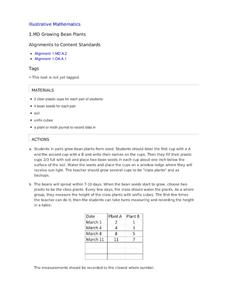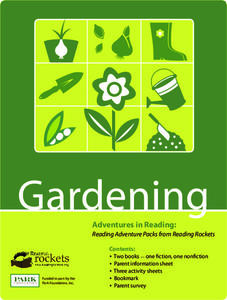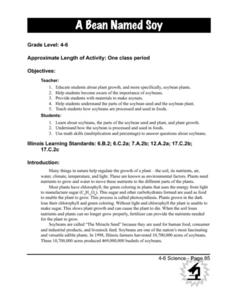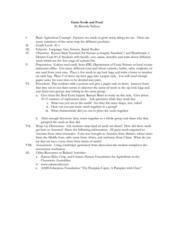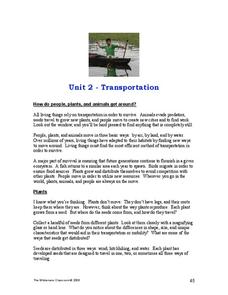DocsTeach
Sequencing from Seeds to Harvest
Explore the farm to table experience in a fast-paced lesson on gardening. The activity uses image sequencing to help young scholars understand the process of growing food from seed to harvest. Academics also participate in group...
Baylor College
Needs of Plants
What better way to learn about plant life than by creating a class garden? Young botanists start with a brief discussion about radishes before planting seeds and watching them grow. To determine the importance of water, sunlight, and...
Education Outside
Seed Saving
After a discussion of the factors that affect seed germination, class groups harvest and preserve seeds from the school garden.
Baylor College
Do Plants Need Light?
Turn your classroom into a greenhouse with a lesson plan on plant growth. First, investigate the different parts of seeds, identifying the seed coat, cotyledon, and embryo. Then plant the seeds and watch them grow! Measure the new plants...
Illustrative Mathematics
Growing Bean Plants
Plant growth experiments offer rich, cross-curricular learning opportunities that can really excite and engage young learners. In this series, children work in pairs planting, measuring, and comparing the height of bean plants in order...
Cornell University
Weed IPM
Go on a weed hunt! Scholars gain insight into the characteristics of plants and examine the outdoor environment in order to identify five different types of weeds. Learners then show what they know with a one-page reflection.
Curated OER
Seed Socks
Students explore how seeds travel. In this seed disbursement instructional activity, students head outside in their bare socks. Students walk around then before going inside they take the socks off and examine what their socks picked up....
Curated OER
Let's Get Carried Away
Learners discover how seeds travel from their parent plants in search of water, sunlight, and nutrients, and conduct experiments in which they note characteristics that encourage seed dispersal by means of wind, water, animal carriers,...
PBS
Reading Adventure Pack: Gardening
A Reading Adventure Pack invites scholars to start gardening. Following a reading of two books—fiction and nonfiction—young green thumbs repurpose food containers to grow an herb garden in their kitchen, plant seeds in starter pots out...
Curated OER
The Dirt on Plants
Students draw and label the four parts of a plant. They describe changes that are part of the common life cycle. Students follow various one and two step directions. They are asked to discuss that they can recall about plants.
Curated OER
Soybeans: The Miracle Seed
Students discover why soybeans are called the "miracle seeds." They make their own soynuts and share other foods made from soybeans. They create a bulletin board of soybean products.
Captain Planet Foundation
Square Foot Fall Garden
First graders learn the basic needs of plants and identify geometric shapes while planting a fall garden. Combining math and science in one lesson, the resource guides kids through starting their class garden as they discover the...
Outside Education
Plant a Plant in Anything!
Primary graders repurpose items brought from home to create containers for plants. After poking holes in their containers, kids add soil and plant seeds or transplant an item, and then observe and draw conclusions about which items make...
Serendip
Photosynthesis and Cellular Respiration
How does energy from the sun make plants grow? Scholars move step by step through the processes that promote plant propagation during a detailed lesson. The resource illustrates ADP production and hydrolysis, then allows learners to...
Curated OER
Grow Your Character Bookmarks
Students make bookmarks out of seed paper to study the growth of seeds and complete an activity for the Six Pillars of Character. In this science and character instructional activity, students describe the stages of growth of plants and...
Curated OER
Grain Seeds and Food
Students observe the characteristics of different seed types. They classify, sort, name and write about the seeds.
Curated OER
Transportation
Students read about various modes of transportation for people, plants, and animals. In this transportation lesson, students read information about the transportation modes for people plants, and animals using water and land. Students...
Curated OER
Farm Products Help Me Grow
Students view a display of empty food containers (or illustrations). They select a food and decide as a class if it has an animal or plant origin. Students view a display of common farm animals that are commonly eaten (cow, pig, chicken,...
Desert Discovery
Life Cycle of the Saguaro
Third graders make books which illustrate the growth and development of a saguaro cactus from its beginnings as a seed all the way through its death. They trace the life cycle of the saguaro, identify each of the stages in its life, and...
Curated OER
Plants
Students identify and label parts of a plant. They will construct a plant from art material and describe the purpose of each part for the plants survival. Students author a book with pictures and words or a story about a plant.
New South Wales Department of Education
Plant Groups
Bryophytes can grow in temperatures just above zero degrees. This 17th installment in a series of 20 introduces learners to the five groups of plants: algae, bryophytes, pteridophytes, gymnosperms, and angiosperms. Classes then explore...
Virginia Department of Education
Weather Patterns and Seasonal Changes
Get your class outside to observe their surroundings with a lesson plan highlighting weather patterns and seasonal changes. First, learners take a weather walk to survey how the weather affects animals, people, plants, and trees during...
Curated OER
Great Gravity, Batman!
Eleventh graders are introduced to the effect of gravity on plant growth. They describe the major processes and mechanisms by which plants grow, develop, and supply various products, including energy and nutrition, needed by other...
Curated OER
Soil and Agriculture: Lesson 4 - Agriculture and Soil
Learners determine how the various levels of minerals in the soil, as well as the pH of the soil, affect the growth of plants in these plant growth experiments.






